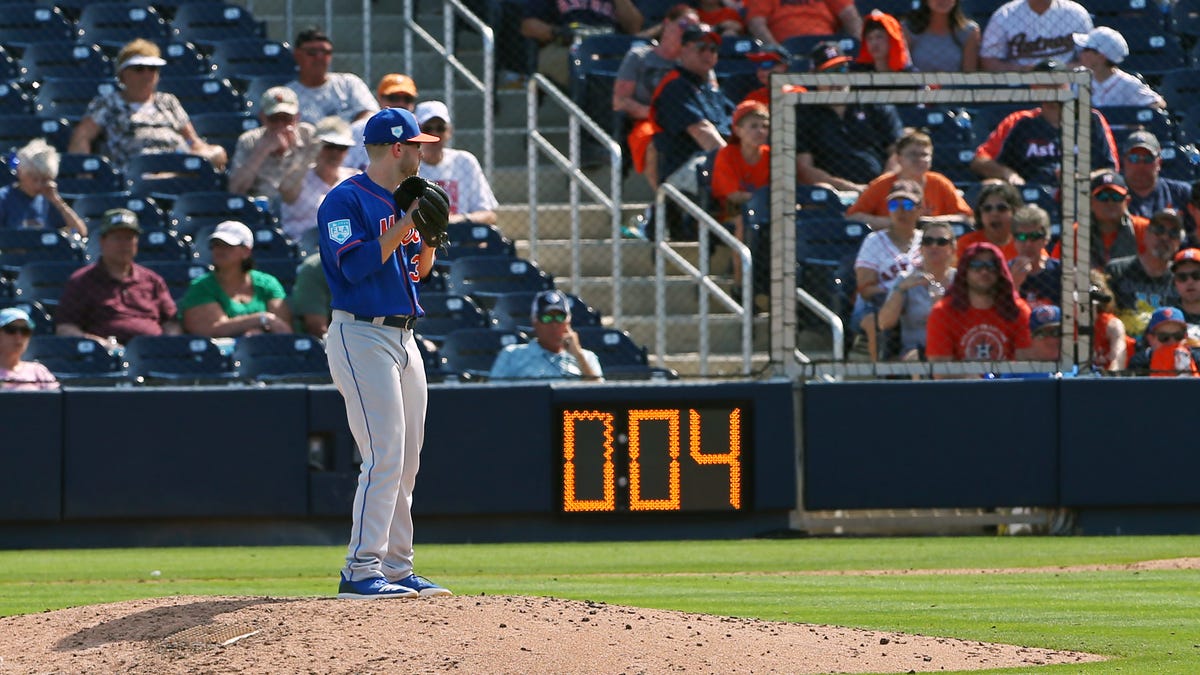MLB pushing long overdue rule changes for 2023

So far in 2022, the batting average across MLB is .243 — the lowest mark for the entire league since 1968. On-base percentage sits at .312 — the lowest mark since 1972. Slugging percentage is currently at .395 — the lowest since 2014. OPS is at .707, once again, the lowest since 2014. It’s no secret that hitters have struggled in 2022. Just five years ago, batting average was 12 points higher, on-base percentage was 12 points higher, and slugging percentage was 31 points higher. We thought the elimination of spider tack and other sticky substances from pitchers’ repertoires would help liven bats across the league, but it wasn’t spider tack creating this second dead-ball era, it’s apparently the ungodly amount of data available to MLB teams.
Earlier today, it became official. MLB will implement new rule changes as early as next season. The two big ones are the implementation of a pitch clock and the banning of the defensive shift.
It was also decided that the bases would be larger next year. That’s pretty much irrelevant though. Maybe stolen bases will be easier. I don’t know, but in the face of the pitch clock and shift restrictions, it’s inconsequential.
The pitch clock is obviously long overdue. One of the biggest complaints from younger fans is that games just take forever to get going. The pitch clock should fix that problem. Minor League Baseball had been testing the pitch clock for years, and it had been a wild success. Games were consistently under two-and-a-half hours, yet neither hitting nor pitching seemed very affected.
G/O Media may get a commission

Simply compatible
All the essentials to help you monitor your fitness, keep connected, track your health, and stay safe. Now up to 20 percent faster, with features like Crash Detection and enhanced workout metrics, it’s a better value than ever.
Games would still routinely finish with around seven to 10 runs. Hits would come at the same rate. The only difference was the speed of the game. Games were flying by, and while that may damage teams’ ability to sell concessions or memorabilia during the regular season, it should theoretically help television deals in every market as younger fans should be more likely to watch games all the way through. That ad revenue money should be even sweeter.
Then, there are the shift regulations.
Oh, boy. Some people believe this will change the game entirely. It will not. Some people believe it’s a cop-out for hitters who never learned to hit to all fields. It is, but that doesn’t mean this was a bad decision.
No matter what MLB did about the shift, fans were going to be mad. In my opinion, shift restrictions are a good thing. With the amount of data every team has on every hitter, every team basically knows where each opposing player is going to hit the ball if their pitcher hits their spots. It’s a wonder anybody reaches base. Line drives up the middle used to be guaranteed base hits. Now, they’re groundouts to shortstop. A pulled line drive into right field by a left-handed hitter used to be a single. Now, it’s a lazy fly out to the second baseman who’s playing 30 feet out onto the grass.
While I do believe hitters are being coddled with these shift restrictions (learn to bunt if you can’t hit the other way!), I also believe that these restrictions are what’s best for the growth of baseball. While some hardcore fans are going to be upset, they’ll still watch. However, MLB has long needed a way to reach its untapped consumer market, and making changes to create more offense is probably a good starting point.
I also believe it’s a little much to prevent infielders from playing in the outfield grass. With only two players allowed on each side of the bag at any given time, even if the second baseman was lined up in shallow right, there would still be a massive hole that the hitter could slug through. Furthermore, without the shortstop lined up closer to the plate on that side of the bag, any weak ground ball would likely result in an infield hit. Basically, if you’re going to prevent people from lining up wherever they want on the infield, at least let them position themselves wherever they need to on that side of second base. That’s how I see it.
If you still hate these rule changes, you’ll be happy to hear that they are not set in stone indefinitely. As Brewers’ manager Craig Counsell said, “I think that’s one of the modes that baseball has to get out of. We can be wrong, but we’re trying to make it better. We have to try things to make it better. Sometimes you have to fail to do things better. We can be wrong, because it will get us closer to a better answer.” If these changes do nothing to grow the game, or help MLB offenses, then shoot, MLB might just go back to the set of rules we see today.
We’re not sure how long these rules will be in effect, if they’re ever removed at all, but MLB needed to implement these changes just to see how it would affect their outreach. Faster games with more offense? That sounds like a dream come true to me. As much as we may not want to see the game we’ve grown to love change, a worse scenario would be for people to never give baseball a chance because they find it boring. I want to share the love of my favorite sport with everyone and if these rule changes make even one person I know a baseball fan, then that’s one more person I can invite out to a game or talk about stats with over a beer. That’s what these rules could bring to the table, and I’m all for that.
For all the latest Sports News Click Here

